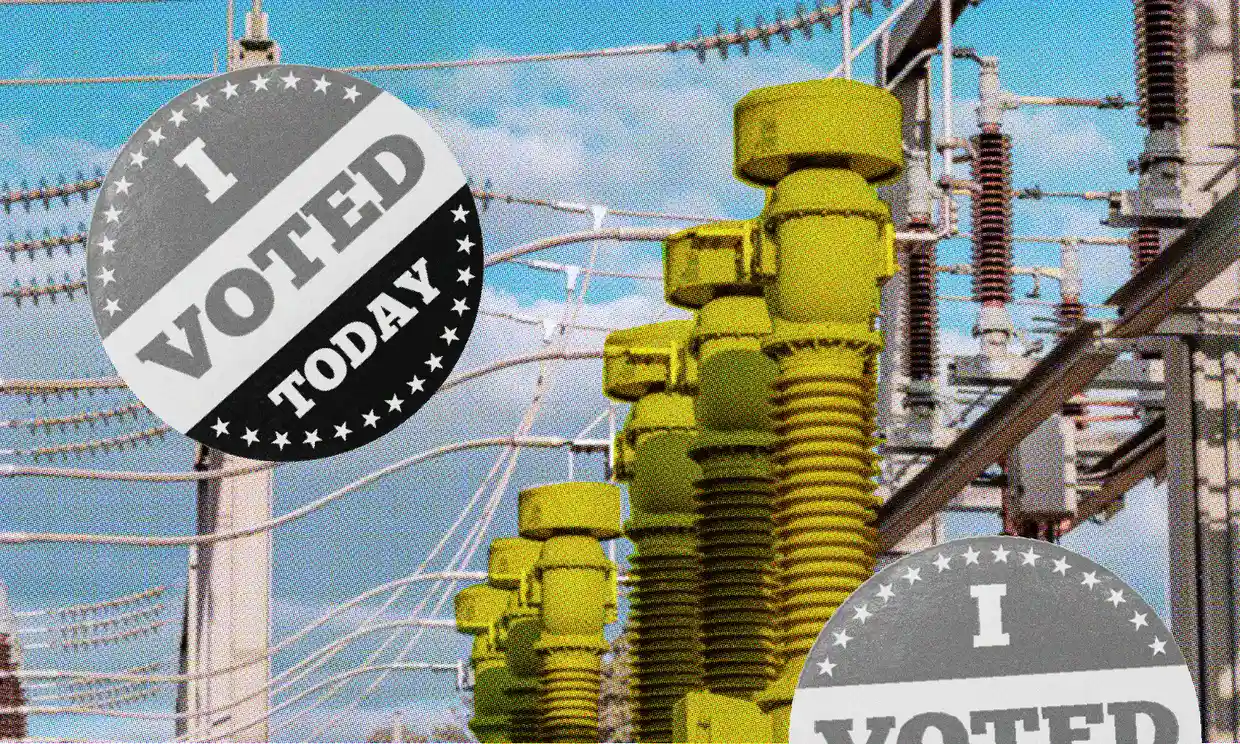Maine power companies are spending millions to defeat a vote to dethrone them
This fall, Mainers could cut ties with their utilities. The companies are buying influence to try to stay in power.

Published in the Guardian, Portland Press Herald
Residents in Maine are about to be bombarded with a multimillion-dollar public relations campaign aimed at saving the state’s two dominant electric utilities from being voted out of existence in November.
If Mainers vote yes, they will make history – endorsing a first-of-its-kind plan to create a state-level, public power company through a hostile takeover.
But the parent companies of the existing utilities are spending millions to try to stop that.
It’s a vote which experts say could reverberate around the country as legacy, investor-owned utilities are being challenged to decarbonize while state officials adopt more aggressive climate agendas amid customer frustration at high rates and outages.
“This is one ship they don’t want to see launched,” said Kenneth Colburn, a former consultant with the global energy policy firm Regulatory Assistance Project, speaking about investor-backed utilities across the United States. “Because it could turn into an armada.”
Existing utilities want to maintain control over the poles and wires and the profits that flow from them while activists say a not-for-profit company managed by local people can bring about a transition that’s more reliable and less costly.
In Maine, the ballot initiative was launched by a citizens group called Our Power.
Supporters want to buy out the assets of Central Maine Power (CMP) and Versant Power – which distribute 97% of the state’s electricity – and replace them with Pine Tree Power, a new, not-for-profit distribution utility.
The ballot initiative has already been outspent 17 to one by the parent companies of the two utilities, Avangrid and Enmax. Together, the two legacy power companies have given $18.4 million to three ballot committees, which have spent $16.5 million fighting back against what they see as an existential threat. Those committees received 100% of their funding from the utilities.
The referendum presents a threat not only to Avangrid’s business model in Maine, said Colburn, the former energy policy consultant, but to the utilities it operates in Connecticut and New York.
Lucy Hochschartner, deputy campaign manager of Our Power, says Maine is ready for the change, which was in part spurred by the state’s high level of public interest in climate change issues. “To me, it feels like the logical next step,” she said. “Is it bold? Yes. Is it necessary? Yes.”
Public power advocates point to the Orlando suburb of Winter Park, Florida, to bolster their case. Residents there voted in 2005 to buy the assets of the incumbent power company. It is among 2,000 towns and cities served by not-for-profit electric companies, according to the American Public Power Association.
Takeovers are rare, and usually involve cities, a process called municipalization. Since 2000, more than 60 communities have considered municipalization, but only nine proceeded, according to a 2019 study for the Edison Electric Institute, which represents investor-owned utilities.
The fight in Maine is unprecedented in scope and potential losses. In smaller takeover battles, incumbent utilities lost a share of their business. In Maine, CMP and Versant are threatened with going out of business.
The most affluent ballot committee, Maine Affordable Energy, is paying a trio of former state legislators to advocate against the proposed power alternative, according to public records and interviews. It also paid $5 million to a Democratic media and political strategy firm called Left Hook that regularly works with the Democratic Congressional Campaign Committee and is staffed with Obama administration alumni.
Charlotte Warren, a Democratic former legislator, was one who received payments. She reported to the Maine ethics commission on May 1, 2022 that she signed a consulting agreement with a digital marketing firm that has been paid about $266,000 by Maine Affordable Energy. She was still in office at the time. But Warren failed to disclose her affiliation two days later, when she co-signed an op-ed against the ballot measure in the Portland Press Herald.
Warren said her actions were adequate. “I did then what I have always done – reported any outside income or new projects I was working on to the legislature. That’s public and anyone can see it,” she said.
Maine Affordable Energy later spent thousands of dollars on Facebook ads featuring the op-ed. It was shown to hundreds of thousands of Mainers, creating the appearance of widespread opposition.
Willy Ritch, the Portland consultant heading up the anti-takeover campaign, says he would not characterize the actions of the pro-utility ballot committees as a public relations campaign, but is instead part of a “coalition that is opposing a statewide referendum proposal.”
Yet, experts disagree. “It’s really hard to recognize the features of a corporate influence campaign a lot of the time,” says Dr Melissa Aronczyk, a professor at Rutgers University who studies the public relations industry. “Because it looks so much like what activists or advocates or ordinary groups on the other side are trying to do. And that’s by design.”
Maine has strong campaign finance laws, and its utilities must disclose their political spending – a rarity in the United States. Adding to the complexity, though, is that neither of Maine’s top two power companies create electricity; they only distribute it. And Maine has one of the cleanest electricity mixes in the country. CMP’s parent company is also ranked among the top U.S. wind and solar generators.
Mainers, however, consider the two companies unreliable, expensive and out-of-touch. Maine is one of the most heavily forested states, which means when trees topple, powerlines can be down for days. CMP ranks poorly for customer service. It also botched a rollout of a new billing system in 2017. And it’s under fire from renewable energy advocates who accuse it of foot-dragging large solar farm connections.
Opponents of the existing utilities also paint a picture of greedy, global interests siphoning money away from Maine and thwarting the local control needed to upgrade the grid. This is because CMP’s parent company is owned by Iberdrola SA, a Spanish energy conglomerate whose largest shareholder is the Qatar Investment Authority. Versant Power is owned by Enmax, based in Calgary, Canada.
Come November, voters will see this question: “Do you want to create a new power company governed by an elected board to acquire and operate existing for-profit electricity transmission and distribution facilities in Maine?”
The proposal for the new plan would create an elected 13-member board made up of a mix of residents from across the state and designated experts. The board would hire a private grid operator chosen through a competitive bidding process.
Avangrid is also separately funding a referendum campaign called No Blank Checks, which would require voter approval for the state to borrow more than $1 billion. The campaign is aimed at discouraging voters from endorsing Pine Tree Power.
But how voters cast their ballots may come down to an article of faith. That’s because voters won’t have a definite date for the creation of the new entity, nor certainty on how it would affect their electric bills. If the ballot initiative to create Pine Tree Power wins, that’s just the beginning. Next, the value of each utility’s assets must be calculated and paid to the companies. The companies are currently worth some $5.4 billion, according to their latest company reports. But CMP says the ultimate sales figure could jump to $13.5 billion.
And no one can be sure how many years it could take for the inevitable legal challenges to play out. Our Power estimates three to four years. Maine Affordable Energy says 10 years is more likely.
As election day nears, though, utility executives in other states will be watching the campaign.
Floodlight depends on a community of readers like you who are committed to supporting nonprofit investigative journalism. Donate to see more stories like this one.


